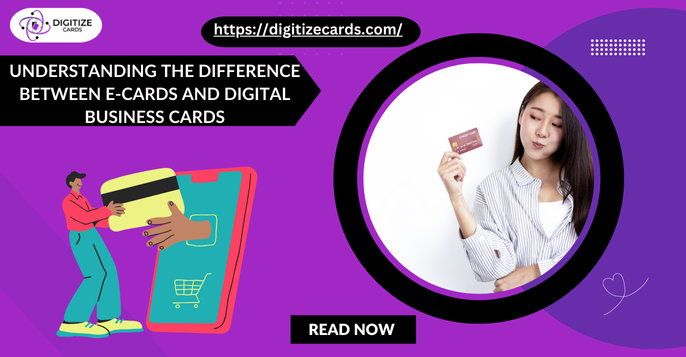In today’s digital world, traditional methods of communication and networking are evolving rapidly. Two popular innovations that have emerged in this landscape are e-cards and digital business cards. While they might seem similar at first glance, they serve different purposes and are used in distinct contexts. This blog will explore the key differences between e-cards and digital business cards, highlighting their unique features, uses, and benefits.
What Are E-Cards?
Definition and Purpose
E-cards, or electronic cards, are digital versions of traditional greeting cards. They are sent via email or social media to celebrate occasions, express sentiments, or convey messages. E-cards can be animated, interactive, or simply a static image with text.
Common Uses
E-cards are typically used for personal and social purposes, such as:
- Celebrations: Birthdays, anniversaries, holidays, and special occasions.
- Greetings: Sending warm wishes, congratulations, or condolences.
- Invitations: Inviting friends and family to events like weddings, parties, and gatherings.
- Thank You Notes: Expressing gratitude for gifts, support, or favors.
Features
- Customization: Many e-card platforms offer customizable templates, allowing users to add personal messages, photos, and animations.
- Multimedia Elements: E-cards can include music, video, and interactive elements to make the message more engaging.
- Ease of Use: E-cards can be created and sent quickly, often with just a few clicks.
- Environmentally Friendly: As digital products, e-cards eliminate the need for paper, making them an eco-friendly alternative to traditional cards.
Benefits
- Convenience: E-cards can be sent instantly, making them ideal for last-minute greetings.
- Variety: A wide range of designs and themes to suit any occasion.
- Cost-Effective: Many e-cards are free or inexpensive compared to physical cards.
- Accessibility: Recipients can easily access e-cards from their digital devices.
What Are Digital Business Cards?
Definition and Purpose
Digital business cards are electronic versions of traditional business cards used for professional networking. They contain contact information and other relevant details, such as company logos, social media links, and websites. Digital business cards can be shared via email, QR codes, or mobile apps.
Common Uses
Digital business cards are primarily used in professional and business contexts, including:
- Networking Events: Conferences, trade shows, and business meetings.
- Client Interactions: Sharing contact information with potential clients or collaborators.
- Job Searches: Exchanging details with potential employers or recruiters.
- Marketing: Promoting personal brands or businesses.
Features
- Interactivity: Digital business cards can include clickable links, videos, and interactive elements.
- Real-Time Updates: Information on digital business cards can be updated instantly, ensuring that contacts always have the most current details.
- Analytics: Some digital business card platforms offer analytics to track when and how your card is viewed.
- Integration: Digital business cards can integrate with CRM systems, email marketing tools, and other business applications.
Benefits
- Efficiency: Digital business cards can be shared instantly via various digital channels, reducing the need for physical cards.
- Eco-Friendly: Like e-cards, digital business cards eliminate the need for paper, contributing to sustainability.
- Professional Appearance: High-quality designs and interactive elements can enhance your professional image.
- Cost Savings: Eliminates the costs associated with printing and reprinting physical cards.
Key Differences Between E-Cards and Digital Business Cards
Purpose and Context
The primary difference between e-cards and digital business cards lies in their purpose and context of use. E-cards are used for personal and social communication, while digital business cards are intended for professional networking and business interactions.
- E-Cards: Focus on personal messages, celebrations, and greetings. Focused on professional messages during professional setting.
- Digital Business Cards: Focus on professional information sharing, networking, and business promotion.
Design and Content
E-cards and digital business cards also differ in their design and content:
- E-Cards: Often colorful, playful, and designed to evoke emotions related to specific occasions. They may include animations, music, and personal messages. Digital visiting card maker online platforms are available that will give you plenty of items to choose for.
- Digital Business Cards: Typically more formal and professional, featuring contact details, company logos, and links to professional profiles and websites.
Delivery Methods
While both can be shared digitally, the methods of delivery vary:
- E-Cards: Usually sent via email or shared on social media platforms, since it’s an online business card.
- Digital Business Cards: Shared via email, QR codes, NFC technology, or specialized mobile apps.
Customization and Updates
Both e-cards and digital business cards offer customization, but the scope and purpose differ:
- E-Cards: Customized with personal messages, photos, and themes related to specific occasions. Once sent, they cannot be updated.
- Digital Business Cards: Customized with professional information and branding elements. They can be updated in real-time, ensuring recipients always have the latest information.
Interactivity and Features
While both can include interactive elements, their use differs:
- E-Cards: May include animations, music, and interactive elements to enhance the recipient’s experience.
- Digital Business Cards: Often include clickable links, videos, and integration with professional tools and platforms.
How to Choose Between E-Cards and Digital Business Cards
Consider Your Purpose
The first step in choosing between an e-card and a digital business card is to consider your purpose:
- Personal and Social Use: If you want to send a greeting, celebrate an occasion, or express sentiments, an e-card is the appropriate choice.
- Professional and Business Use: If you aim to share contact information, network, or promote your business, a digital business card is the right option.
Think About Your Audience
Understanding your audience is crucial:
- E-Cards: Suitable for friends, family, and acquaintances in personal contexts.
- Digital Business Cards: Appropriate for colleagues, clients, potential employers, and business partners.
Evaluate the Features
Consider the features that best suit your needs:
- E-Cards: Look for customizable templates, multimedia elements, and ease of use.
- Digital Business Cards: Seek options that offer real-time updates, interactivity, and integration with other professional tools.
Assess the Delivery Method
Choose the method of delivery that aligns with your preferences and those of your recipients:
- E-Cards: Ideal for sharing via email or social media.
- Digital Business Cards: Convenient for sharing through various digital channels, including QR codes and mobile apps.
Conclusion
E-cards and digital business cards are powerful tools in the digital age, each serving distinct purposes in personal and professional contexts. E-cards are perfect for sending greetings, celebrating occasions, and expressing sentiments in a personal and engaging way. If you want one for yourself, Digitize Cards is the perfect place for you. It usually offers the best digital business cards to grow your business, however, you can use it for personal use as well.
Understanding the differences between these two digital innovations can help you choose the right tool for your needs. Whether you’re looking to send a heartfelt birthday wish or make a lasting impression at a business conference, knowing when to use an e-card or a digital business card can enhance your communication and networking efforts in today’s digital landscape.
As you explore these tools, remember that both e-cards and digital business cards offer significant advantages in their respective domains. Embrace their unique features, customize them to reflect your personality or brand, and enjoy the benefits of enhanced communication and connectivity in the digital world.



